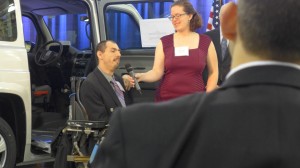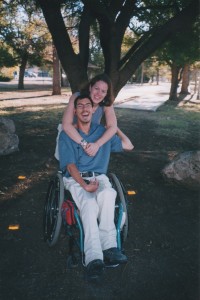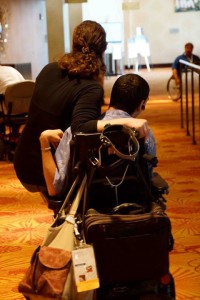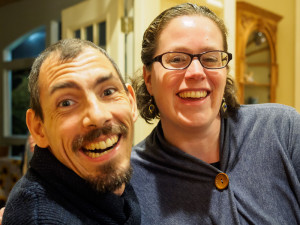There have been a handful of times when I, the able-bodied wife, has answered those who refused to serve or work with my husband, a brilliant college-educated and intellectual man with Cerebral Palsy.
Maybe the first time I experienced the assumptions about Barton was when I was asked to speak to my grandmother. At that time, I visited her when Barton and I were engaged, but our family had not met him yet. A social progressive of her time, I was asked:
What kind of life would I see for myself marrying a retarded man?
Shocked, I could not believe that a family member, someone who had spent a lifetime helping others in need and a family that prided itself on non-discrimination was speaking in this manner. What internal and subtle thoughts does each of us carry subconsciously about “the other”?
When my family had the opportunity to get to know Barton, there is now undeniable support for our marriage and our lives together. All it took was the time to get to know one another on a deeper level.
Refusal of Service: Keeping “the Other” Out
Since that time, all too often I would see the number of times people would hang up on my husband because they did not understand him or nod when in actuality, they could not keep up with the long-winded soliloquies that would break down all barriers of capability for a man in a wheelchair.
Even in communities that claim acceptance. The first was to our church community, where we were treated harshly for wanting to find an accessible entrance inside the building, and how every time we came on a day other than Sunday, someone had to spend at least 20 minutes finding the keys to open the gate to let us in. Clearly, in this instance, gates were meant to keep people out just as much as they were to keep valuables in.
While we left that particular church for a time, we returned several years later to find improvements in access and inclusion for people with and without disabilities. Yet, there is more work to be done for full inclusion.

Barton speaks at the MV-1 launch event in 2014.
On another occasion, we met a nationally recognized speaker highly regarded in our community, who would later tell us we could not join a speaking-club because Barton would not be able to complete the objectives due to his slurred speech.
Ironically, Barton has spoken at many national and local conferences and events since that time.
Sadly, now when we visit any other speaking club, the first question we ask is if they would accept someone with slurred speech.
While we think that the refusal to serve a person with a disability doesn’t happen, it happens all too frequently.
Recently, I asked Barton if he could pick out new phones for us when I damaged mine beyond repair. He walked down to the store he had done business with before, and the manager refused to serve him. Refused. Barton was giving them our business, and because they didn’t want to deal with someone they couldn’t understand, Barton left empty-handed. I even called afterwards, and the manager would not even apologize for this overt discrimination.
So, we changed cell-phone carriers.
Breaking Down Barriers by Embodying Life
Barton has his own way of breaking down barriers by shining a brilliance that is undeniable and challenges the concept of what people think is possible.
And when we are together, people see the love between us which melt not only the assumptions about us, but themselves as well.
If we can find love and happiness, what is holding them back?
Even in moments when we let our guard down, we impact other families. At a networking event last week, a mother approached us to share her own experience celebrating the life of her daughter with a severe disability who has lived longer than the medical community had assessed.
In sharing ourselves, we change the way the community looks at people with disabilities.
Our national and statewide rhetoric is dividing people into boxes, not for the amazing, capable, thriving souls that we are. We are seeping ourselves in the division of the other, when we (as a culture) become fearful, distant, angry, and violent against someone we don’t understand.
Are there people who do horrible things, yes. Do we need to stop them, yes. Do we need to punish entire cultures and communities because of the actions of specific individuals, no.
The Value of Diversity and Inclusion
Everyday, Barton pushes me in ways I wouldn’t expect. We go through life’s challenges in waves, sometimes brilliantly succeeding and at other times miserably failing. And I would not take back one single moment.
I have learned to laugh. To love. To see. To slow down. To question. To persevere. To pick up, and let go, and learn, and move on. And because of this, I live a deep life.
Sure, there are times that are incredibly frustrating when we are ready to give up. And at other times, the undeniable way that we move through life as a couple is magical and mystical. And we are reminded of the purpose we serve.
And I am better for living with someone who challenges me in ways that I would not expect.
What if the communities in our world came together and moved in this way, learning from one another? What if we unlocked the gates? And we could truly see the other, even if we did not agree, as different aspects of ourselves?
Related Posts:
Independence Day: Celebrating Diversity and Independence with a Disability
Nurturing Our Relationship: Coming Back to the Source
Stepping Up to Embrace Otherness



